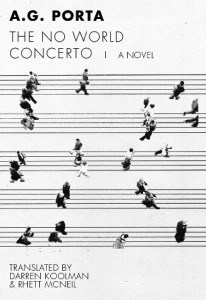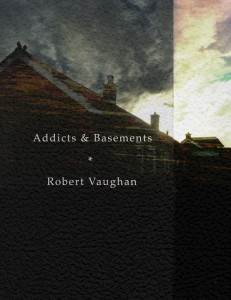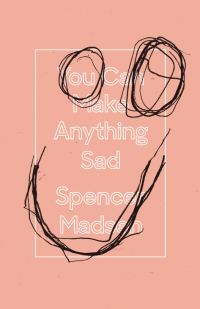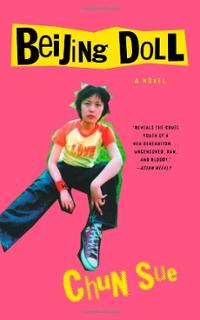The No World Concerto by A.G. Porta
 The No World Concerto
The No World Concerto
by A.G. Porta
Translated by Darren Koolman
Dalkey Archive (Spanish Literature Series), 2013
339 pages / $16 Buy from Dalkey Archive
I’ve been getting over this cold for about ten days now, and last week I had an especially bad night. I had taken 10mil of tussin pretty late, and now I realize the medicine was keeping me awake. At one point in the night my left leg lost circulation, and when I woke up, I thought, “Oh great, now that leg is entering the No World.” And as I slept, waking every hour or so, I had this creeping fear that more of me would fall into the No World. A terrifying prospect to be sure.
For A.G. Porta, the No World isn’t Bizarro World, but the subliminal articulated in a language we can’t understand. In The No World Concerto, out now from Dalkey Archive, A.G. Porta considers the limited tools we have for approaching reality and the so-called subliminal.
Like Cortázar’s 62 a Model Kit, The No World Concerto takes place in an unnamed city “the neighboring country’s capital” aka Paris. A “Screenwriter” obsessively writes a script that follows his relationship with a young piano prodigy, “the girl,” herself writing a sci-fi novelized account of their affair. The plot of The No World Concerto, comes across as somewhere inside and outside of all of these texts.
 The girl’s novel follows the story of an aging Alien-hunter.
The girl’s novel follows the story of an aging Alien-hunter.
Early on in The No World Concerto, the girl outlines her relationship to the No World:
I hear voices, the girl confesses. I think they come from another world. The young conductor asks her how she can be sure. How doesn’t she know the voices aren’t just inside her head? But she’s utterly convinced of it, and that should be proof enough it seems. The young conductor says no can know if something exists in and of itself outside the mind…They’re not even voices from this world, insists the girl, they’re from a false world, a No World created by some alien consciousness…(her novel) touches on this…the No World she writes and rewrites without ever getting anywhere; the No World that’s always expanding inside her, ever ripening, while never reaching maturity.
After co-writing a novel with Roberto Bolaño in the early 1980’s, Porta reportedly shut himself off from the world rereading Joyce and Wittgenstein. In No World, he lays the Wittgenstein on pretty early and pretty thick, highlighting the central paradox of the novel: Although our reality is bounded by language, language cannot describe all of reality.
Consider the joke: “Jean-Paul Sartre is sitting at a cafe. He says to the waitress, ‘I’d like a cup of coffee, please, with no cream.’ The waitress replies, I’m sorry, Monsieur, but we’re out of cream. How about with no milk?’”
For Porta, the act of literature is a negative act, naming thus negating imagined realities, because each “reality” corresponds with a multitude of unknown realities. Jacques Roubaud identifies this as the plurality of worlds. He says: (since I think/that the real/ is in no way real/how am I to believe/ that dreams are dreams)
So while the constant iteration of realities (via literature) might voice a critique towards a status quo, that critique will always be limited by the language we have. The infinite No-Worlds and Bizarro Worlds and alternate realities, (Crises on Infinite Earths, etc) of this world and reality are not really positive (or negative) mirrors, but rather frustrated slidings along an unknown continuum. Blanchot identifies this as the lot of author’s struggling away at a “work,” somehow existent, although ephemeral. Knowing that the transfer of this “work” from the subliminal kills it, and that the true triumph of literature comes somewhere in it’s ability to hold up the shortcomings of language.
While this might sound a little overwrought, Porta has a very light touch. And The No World Concerto is funny and enormously readable. Outside of her novel, “the girl” flirts with New Music stardom, adopting a John Cage-like rejection of rigid serialism in favor of indeterminancy.
Her Little Sinfonietta group performs a piece very reminiscent of The Green Table by Kurt Jooss.
By the third act, the “Screenwriter” sinks into mad-monk schizophrenia, and the action culminates in a very Robbe-Grillet-esque shocker. Although hailed in Spain as “one of the top ten Spanish-Language novels of the decade,” The No World Concerto resists simple interpretation, as it interrogates literature and compulsion in the modern world.
***
Joseph Houlihan lives and writes in Minneapolis, MN.
July 11th, 2014 / 10:00 am
Addicts & Basements by Robert Vaughan
 Addicts & Basements
Addicts & Basements
by Robert Vaughan
Civil Coping Mechanisms, February 2014
142 pages / $13.95 Buy from Amazon
While waiting for clothes to dry in a dingy, low-maintenance laundromat—leaning beside an out-of-service soda machine was a discolored Fisher-Price Playset (in case anyone wanted to conveniently scare/scar the hell out of their kids)—I tore into Addicts & Basements, Robert Vaughan’s slim collection of brisk, tightly-constructed miracles of human endurance both humorous and sad (often beautiful), as coin machines, some entirely gutted, struggled haphazardly against insurmountable odds:
A man is mailed his ex’s pubic hair; a lonely waitress perusing personal ads becomes smitten by Bondage Man; a father kidnaps two siblings who may or may not be his kids; and a husband surfs porn sites while wearing his medicated wife’s panties.
Vaughan’s talent in handling the plights of characters many would write off as pathetic grotesques is masterful, and he does it with love and sincerity:
He decided to give it a whirl in the toilets of Grand Central Station. He stopped by Wigs and Plus on 14th Street where the owner, Sunny, would sell him a cheap piece “for his mother.” Then he’d prop himself in the furthest stall from the door every Sunday morning. Wig in place. Like a parishioner. Or a TV evangelist. Or a congressman.
When it comes to flash fiction (those brief, punchy, not-quite-prose-poems) Vaughan is an upper-level video game boss. “Gauze, A Medical Dressing, A Scrim,” with its impeccable comedic timing, might be one of the best I’ve ever read. “Neighbors,” about two suspicious pet owners, isn’t too shabby either:
He likes her smile, imagines seeing those guinea pigs ripped into shreds. He untangles the leash. “C’mon, boys.” He imagines what she looks like covered in whipped cream. Even her heels. They keep laughing.
“On the Wings of a Dove” turns the nightmare juice up to 11 with Vaughan’s haunting tribute to Matthew Wayne Shepard, a young man tortured and killed by homophobes in Wyoming:
his coma was so quiet,
one of the killers would
later say, you could almost
hear ice rattling down the canyon
July 11th, 2014 / 10:00 am
25 Points: You Can Make Anything Sad
 |
You Can Make Anything Sad
by Spencer Madsen
Publishing Genius Press, 2014
90 pages / $14.95 buy from PGP
|
1. Spencer Madsen’s new book has what you might call ‘a classic Alt-Lit title.’
2. Like many of his contemporaries, a fair proportion of this work is considering ‘What if…’ something happens and musing on ‘What ifs’ generally. I think this has something to do with the virtual world and what it has done to our brains. As a strategy it is, in itself, almost materially virtual.
3. There are many proper nouns. For me, proper nouns are essential.
4. Computer/technological device interface metaphors, analogies, etc., are a growth area to a large extent pioneered (as far as today’s technological landscape goes anyway) by Alt-Lit writers themselves. Madsen is very good at them. Here is one by him: ‘When you turn the screen brightness down on your computer, everything looks the same but seems a little shittier.’
5. On October 1st, 2012, Spencer encountered a man in a gym and mused on his ‘meaningless’ hairstyles, tattoos, and muscles (‘he does administrative work’) but notes that in a way this gym muscle man ‘is more authentic,’ ‘more purely veneer’ than your everyday person. This is deep, man! By which I mean that the way in which much Alt-Lit concerns itself with screens is down to the fact that screens, smoothness, etc., represent the spirit of our current age (and any age that we can imagine anytime soon on the, now non-existent, horizon) so it is important to face up to them, even if it means facing them to do so. This whole ‘life in front of small screens, large, intermediately sized screens’ is so ubiquitous it needs to be looked at. Alt-Lit does it very well, as does Spencer.
6. ‘A Tumblr called Girls Doing Things featuring photos of fully clothed girls doing normal things like standing in line at the post office or walking a dog’ would be the most genuinely erotic Tumblr of the year. Think about it, folks.
7. Nothing happens in this book in that way where everything happens or rather so many things happen that nothing seems to happen. Word thinks this is ‘verb confusion’ but it is really more about the state of things.
8. I say nothing happens but there is a half-hearted worry about coming to the end of a relationship which is recurrent but which isn’t foregrounded. Although coming to the end of a relationship is a big thing (like moving house, as they say, not enough novels about ‘moving house?’), it’s inevitable that something else will start.
9. Something else does start. He starts going out with someone new. It’s new; he likes it as we all like that kind of thing.
10. He’s good at the old poetic trick of mixing everyday concrete noun combinations like ‘cereal and milk’ with the slightly more amusing concrete noun ‘ice cream’ with a sudden abstract noun ‘emotional stability.’ This is an old trick that will never stop working. He executes it very well. I laughed.
July 10th, 2014 / 12:00 pm
A Sloth’s Perspective
Beach Sloth, cult blogger-extraordinaire, is arguably one of the few things you should actually pay attention to on the Internet. A magnificent poet and semi-anonymous (though some know his secret identity), Beach Sloth is the spirit of discovering new art—plucking it from the depths of the Internet and hidden crevices of the unknown in effort to make us aware. The style of his reviews are poetically analytic and hit off on major points of each work he’s featuring. He covers a wide variety of literature, art, film, music, online activity of Internet poets, and other mediums that peak his interest. Beach Sloth wants to make his art into a money making enterprise. He wants to extend his three fingered claws and touch everyone with his work and insight. You can paypal him at: pleasepaybeachsloth@gmail.com. He tweets at @Beach_Sloth. He also allows you to advertise on his blog. (There’s nothing this sloth can’t do.)
I interviewed Beach Sloth over a course of a week through email about his project, the artistic “struggle”, and his views on indie lit. Being a prominent player in the “alt lit” scene, the blogger’s responses were eye opening and unique to his own. So kick back, relax, and enjoy this sloth’s perspective.

What is Beach Sloth? Why was this alias created? What is your slothy purpose?
Beach Sloth is my way of interpreting the culture I see created online every single day.
I created Beach Sloth after a series of really strange events began to happen in my life. None of them were bad but I was feeling a little bit too comfortable with the daily routines I was going through. Hence Beach Sloth kind of served as a challenge to me to engage more with the world (and Beach Sloth as a project continues to challenge me with a near-endless stream of work).
My purpose is to support others and have others support each other. If that happens I am happy.
How satisfied are you with your work thus far? What would make it better? What would make it worse?
I am pretty happy with my work thus far. I think I am moving in the right direction and I am constantly trying to improve what I do. Some of the work I did in the past seems a bit ‘underdone’ compared to what I do now, in that I am a lot more focused on keeping things concise and edit a lot harder.
My work probably would be better if I ventured outside of my immediate social media realm. One of my goals for Beach Sloth in 2014 is to try and expand my horizons outside of the blog. This has meant a chapbook for Peanut Gallery Press, more submissions elsewhere (I’m bad with submissions in general) and trying to move into more visual work (I want to do a better job of taking advantage of Tumblr’s focus on the visual, something I know I haven’t done enough of in the past).
Honestly I am pretty hard pressed to think what would make it worse. Probably the worst thing I could do would be to sort of shut off Beach Sloth to a few specific writers. I try to keep up a variety of coverage so people do not see the same names all the time. My focus is also on those whose work I particularly enjoy and people who I think deserve more credit. READ MORE >
Beijing Doll
 |
Beijing Doll
by Chun Sue
Riverhead Books, 2004
240 pages / $17.00 buy from Amazon
|
In the world of Chinese lit translated, a common branding method is to plaster somewhere on the cover: China’s Banned Bestseller or The Controversial Banned Sexual Exploration, A New Generation, and so on. Goodreads has at least two lists of China’s Best Banned Books – and it’s become a sort of nerd-o-meter to detect new-to-the-genre readers by seeing if they’re lured to the Banned Bestseller stuff or to more ‘serious’ Classics or Mo Yan (technically banned, but, acceptable).
July 8th, 2014 / 5:01 pm
This Isn’t a Room to Rest In: A Review of Brett Fletcher Lauer’s A Hotel in Belgium
 A Hotel in Belgium
A Hotel in Belgium
by Brett Fletcher Lauer
Four Way Books, March 2014
116 pages / $15.95 Buy from Amazon or Four Way Books
Brett Fletcher Lauer’s debut collection, A Hotel in Belgium, resists. The poems resist narrative as often as they sneak over towards it, snag some, and then move back over the boundary—however arbitrary and fleeting that boundary might be—into a lyric. The poems challenge the reader to follow along with the narrative and/or lyric and then, just like a magician snapping her fingers to get you to look that way, the logic falls apart, falls inward, collapses, rearranges itself in the cavern it fell into, and then shouts back up to you on the surface, saying, “See? See? Didn’t I tell you there was a hole here all along?”
That sense of resistance also becomes a venue for doubling, so that, one thing becomes two, becomes multifaceted, not because everything necessarily exists in a state of constant change, but because the speaker exists in a state of constant change, so his view, his language, reflects that:
In the beginning, my eyes were angled
out a window on a point providing
conclusion while periodic vibrations
of fear aggressively governed
my anatomy. There were others
kept ignorant of the latitude of this
municipality, the river’s proper name,and its source in a local mountain.
It’s important this isn’t construed as
a sales pitch, just a sensible presentation
of the future, sealed as its caskets
like some distant city encircled by
horned predators. Don’t wish the dead
are not. They are.— from “Stockholm Syndrome”
Even the opening epigraph from Goethe delivers this sensation of a doubling and of a resistance: “It is as if a curtain had been drawn from before my soul, and this scene of infinite life had been transformed before my eyes into the abyss of the grave, forever open wide.” It is this uncovering, this unveiling, that alters the view: from infinite life to an abyss of the grave, both existing “forever open wide,” but, in one instance, a peaceful, joyous experience, and in the other, a darker existential reality. The action, though, remains a singular event. It is our interpretation of that action, our view that alters the thing looked at.
Beyond the poems’ resistance to fitting into a binary, the reading of the poems—the syntax and sentence structure, the rhetoric—resists a single, easy read. These are poems we must return to, that we want to return to, so that we can get a better grasp of this poet’s mind. And after reading the book a handful of times, I’ve come to no conclusions on these poems, because the poems don’t conclude their thoughts. There is no resounding, final chord, no final return, no abiding image. Instead, they resonate. They trail off. They get somewhat lost because, the poems suggest, getting lost is a legitimate reaction to the world these poems present and occupy.
Our situation is complicated, full of negations
and negations of negations. To rememberexperience rather than what’s occurring—
this detachment replaced with strangersother strangers recognize.
— from “In a Station of the Metro”
Occasionally, a line arrests us in these poems with its desire to connect with the reader (“Don’t cry. I am touching//your shoulder.”) More often than not, though, the speaker’s sense of confusion returns—which we share as the reader—so, yes, we receive a Frostian momentary stay against the confusion the speaker feels, but, just as soon as we feel that, we’re tossed back into the mix, back into the rubble of ideas, logic and concerns that determine the course of the speaker’s life.
July 7th, 2014 / 10:00 am
Tombo by W.S. Di Piero
 Tombo
Tombo
by W.S. Di Piero
McSweeney’s Books, 2014
65 pages / $15 Buy from McSweeney’s
Tombo is a book about place as much as anything. It’s about San Francisco. Many poems are about place – whether they are explicit about it or not. Di Piero is explicit in Tombo. W.S. Di Piero recently won the Ruth Lilley Poetry Prize, a Guggenheim Fellowship, a National Endowment for the Arts Grant, the Lila Wallace-Readers Digest Award, and writes for the New York Times, among other places. He is an incredibly distinguished poet and McSweeney’s bills him as “a master of the adjective, a master of sound and story.”
I’d never read anything by W.S. Di Piero before this book, which I read primarily at cafes not in San Francisco. Di Piero starts the book by addressing, you, the reader, “Life, as you say, my friend, / is lived in its transitions.” Life is funny like that. The first poem, The Running Dog, involves a brunch I could envy “A breakfast of poached eggs, / spiked coffee, newsy talk, / crushed sun behind the clouds, / marine layer vapors phasing / blue to green, and the body / quivers through its days.” In fact, like living in San Francisco and eating brunch, there’s a lot about the life of the poet that seems enviable, depending on your disposition.
I would highly recommend this book if you appreciate poemy poems full of foghorns, flowers, and random interjections in other languages. Di Piero prides himself on sound and music, and there is a certain music in these poems – while they’re unrhymed free verse, there’s a recognizable rhythm and music throughout.
The poem Sleeping Potions reminds me of a story I heard from a local bike mechanic: A man came into his bike shop, and took a used bike out for a test-ride. The man never came back. He had left his bag with a laptop, credit cards, wallet, and other valuable things, at the bike shop as collateral / insurance. A few days later the bike shop gets a call. The police had found the man “several hundred miles” north of the bike shop – he had no explanation for what he had done – he didn’t know or remember the previous several days. The bike was returned to the shop and the man got his bag and valuables back. But what happened between the shop and hundreds of miles north?
And what’s happened in Tombo during the intervening fugue paragraph? We’ve moved from Hayes Street, to Duboce Triangle, to the N-Judah. We’ve got a look at Market and the Mission and Dolores Park. Di Piero has said that his books “start out as miscellanies.” The poems in Tombo don’t have the kind of narrative arc or grand teleological direction. They’re brief meditations. “If my poems come out right, they tell what it feels like to live in a world of troubled relatedness,” Di Piero said in an interview. I like this idea of troubled relatedness – and I think it’s an interesting way to talk about poems.
July 7th, 2014 / 10:00 am
Brendan Flaherty
People Think I’m Disgusting
People think
I’m disgusting
because I have
a huge house.
I’ve got
restrooms to rest in,
washrooms to wash in,
and water closets
to hold my water,
while I shit
in the yard.
Bio: Brendan Flaherty is an LA-based freelance writer, originally from the Hartford area. His work appears at Fast Company’s Co.Labs, McSweeneys.net, the LA Fiction Review, among others. You can read more of his short writings at BrendanFlaherty.net.
I Will Always Be Your Tour: Alexandra Naughton’s notes from the road on her first book tour
I wrote a book called I Will Always Be Your Whore [love songs for Billy Corgan] and I wanted to go on a book tour, so I made a facebook post back in February earlier this year and some people invited me to read at their reading series and most of them were located on the east coast so I did some research and decided to do an east coast book tour spanning about two weeks, hitting seven cities. I told Jesse Prado who is my bff and brother and he wanted to come along and I told him we should put a book together for him to sell on the tour so I published a book by Jesse called i’ve been on tumblr on my little press, Be About It press. It’s a cute book, it feels nice.
I had no idea how to plan a tour because I never did anything like this before but I did my best and realized my mistakes while they were happening and I feel much better prepared for the next time we go on tour, which we will definitely do again. It’s already been decided.
I hope we were good guests.
Chicago Publishers Resource Center (CHIPRC)
I recently read at an event organized by Peter Jurmu which took place at John Wawrzaszek’s Chicago Publishers Resource Center
I chatted with John a bit before the reading and then asked him to send me a bit more info about the center:
Chicago Publishers Resource Center is a new community space in Chicago that focuses on literary and artistic projects. On Independence Day weekend, CHIPRC will celebrate its first anniversary!
We’re fortunate in that Chicago has such a diverse and thriving publishing community, including a large self-publishing scene from indie comics to zines. There are multiple writing programs in area colleges and universities. It’s funny how everyone is so compartmentalized – people don’t realize the resources at their fingertips. There is not a dedicated space where all these communities can connect. The center is a community space that welcomes everyone looking for a place to meet others, learn a new skill, or simply to get to work.
The name is an homage to the IPRC in Portland, a wonderful resource to artists in that area. I took to focusing on the word publishing, allowing the community to define it as widely as possible. In the digital age, society is writing more than any other time in history. Programming has to include not only print, but digital media; it has to include film, music, theater, and comedy. It has to honor graphic storytelling in comics, animation, shadow puppetry, and design. Writing is not only influenced by all these forms, it is at their center.
CHIPRC’s programming focus has been balanced between craft and projects. The idea of learning, honing, or improving a skill is important to establish a basis for implementation. In the first year, there have been workshops, discussions, meetings, readings, film screenings, work days and more. The ideas come from the community and are led by those in the community.
In the next year, I look to strengthening community partnerships and expand the types of programming offered. It’s been great so far.
So, if you’re wanting to host a reading, lead a workshop (how to make books, get published, do collages, etc, etc), or to find out about upcoming events, then please contact John at chicagoprc(at)gmail(dot)com.
July 4th, 2014 / 1:32 pm


